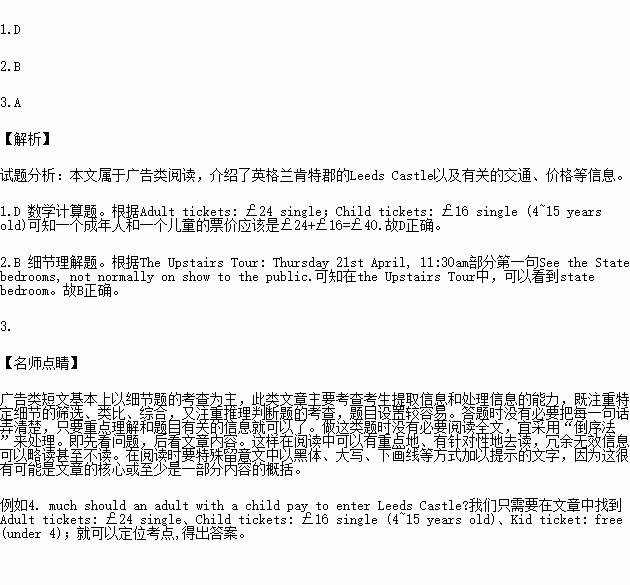题目内容
Leeds Castle is in Kent, England. 5 miles (8 km) southeast of Maidstone. It is built on islands in a lake formed by the River Len to the cast of the village of Leeds. It has been open to the public since 1976.
Opening time: April to September. 10:00—18:00 October to March: 10:00~17:00 Tickets:Tickets are valid for one year from date of purchase giving free repeat visits to the Castle, grounds and attractions. Excludes special ticketed events and Christmas Day.
Adult tickets: £24 single
Child tickets: £16 single (4~15 years old)
Kid ticket: free (under 4)
Transportation:
Coach or express: National Express from London to Leeds Castle directly
Train: Any train from southern cities to Bearsted. transfer by Spot Travel to Leeds Castle. 15 minutes' ride, goes by each hour.
The Upstairs Tour: Thursday 21st April, 11:30am
See the State bedrooms, not normally on show to the public. Hear about the guests of the roaring 1920s. see the bedroom where Edward and Simpson stayed and where Pavarotti was accommodated during his visit.
Price: £5 per person. A valid entrance ticket is required per person
Embroidery (刺绣)Taster Workshop: Sunday 5th June, 10:30am
Learn the basics with expert supervision from members of the Embroiderers Association and sew your own small piece of embroidery to lake home and frame to turn into a cushion or handmade greeting card.
Price: £20 per person.
A valid entrance ticket is required per person. Includes refreshments and all materials.
1.How much should an adult with a child pay to enter Leeds Castle?
A. £10. B. £24. C.£16. D. £40.
2.What can visitors see during the Upstairs Tour?
A. Pavarotti. B. The State bedrooms.
C. A show. D. Artworks.
3.To visit the Embroidery Taster Workshop, you have to_ .
A. get an entrance ticket
B. show your greeting card
C. know about embroidery
D. join an association


 ), 并在其下面写出改加的词。
), 并在其下面写出改加的词。